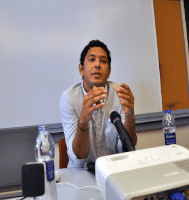SUNDAY OCTOBER 27, 2013
BY ROQAYA ZAMZAM
An Egyptian-American independent journalist said that Egypt appears to be heading towards a more regressive political order than that of Mubarak since June 30. Sharif Abdel Kouddous, speaking on campus last Wednesday, gave a lecture about the Egyptian political scene titled “Egypt’s Struggle: The Revolution, The Political Elite and The Security State.”
Sharif Abdel Kouddous, speaking on campus last Wednesday, gave a lecture about the Egyptian political scene titled “Egypt’s Struggle: The Revolution, The Political Elite and The Security State.”
Abdel Kouddous, who has been covering the January 25 Revolution since its early days, said that the picture right now is not a pretty one. The military and the Muslim Brotherhood are the key players on the political scene, and Egyptians are expected to show support to one side or the other.
He said, the military wants to be in control “in order to push away and pave off the threat of the Islamists, who are painted with a wide brush as all being terrorists,” adding, “the Brotherhood inversely repeats this equation and sees only the deep state and [Mubarak supporters] in the opposition to it.”
The Muslim Brotherhood seemed to be the strongest political power in the country after their candidate, Mohamed Morsi, won the first post-revolution presidential elections in June 2012.
Morsi was removed from power one year later by the military following mass protests that erupted on June 30, 2013.
The removal of Morsi has put the military back in the scene, gaining popularity like never before, he said.
Abdel Kouddous noted that the military is now firmly in control of the country, and they have established themselves as “the final arbiter of power”. He added that any criticism of the army is not accepted by the people.
He said that the security state is primarily targeting the Muslim Brotherhood in their severe crackdown.
“In the face of this assault, the
Brotherhood are claiming for itself the mantle of the revolution,” he said, before adding, “it is painting itself as having tried to reform the state through some legitimate electro process, only to be overthrown in a military coup.”
Abdel Kouddous said that the Muslim Brotherhood’s claims are far from reality. While in power, the government of Morsi tried to “issue policies that are meant to restrict the right to assemble, restrict the right to protest, restrict the right to form NGOs,” he said.
“They spurned a draft law that would have guaranteed the right to form independent unions [and] they presumed neo-liberal economic policies that showed no break from past policies that widened the gap between rich and poor in Egypt,” he added.
He also stated that the Muslim Brotherhood has actively urged the police to use violence against their opposition.
“Morsi fired an interior minister, Ahmed Gamal El-Din, who was blamed for not cracking down harshly enough on anti-Morsi protests. He [then] appointed Mohamed Ibrahim, the current interior minister,” he said.
Morsi also claimed that the police were at the heart of the revolution, and Kouddous believes that this is very far from reality.
“The Morsi government clearly wanted a brutal security sector, and this is the very security sector that is now targeting them with unflinching brutality,” Kouddous added.
He also commented on the June 30 uprising, saying that it was a massive protest.
“Many argue that it was the biggest day of demonstration that Egypt has ever seen,” he said.
He added that it was a very genuine popular mobilization at the beginning. But then, the military saw it as an opportunity to take over the country, and they took advantage of it.
Abdel Kouddous described the Tamarod campaign as one that started off a very revolutionary movement, but later started to “cheerlead” to the Military and approve of all of their actions.
Tamarod was a grassroots movement that was founded on April 2013 as a form of opposition to President Morsi. The movement collected signatures and called for early presidential elections.
Around 22 million Egyptians reportedly signed Tamarod, taking to the streets on June 30 to demand the removal of Morsi. The military supported Tamarod from its early days, and removed Morsi from power on July 4 in reaction to widespread protests as well as the movement.
Abdel Kouddous also said that in the current climate, “anyone who speaks out is demonized. Journalists and foreigners have come under attacks in unprecedented ways.”
He said, “an e-mail came to all foreign journalists ordering that camera crews are now required to request permission before filming anywhere in the country,” adding, “Syrian and Palestinian refugees have been scapegoated as Brotherhood allies and Morsi sympathizers. They have been vilified in the media, they have been rounded up.”
Revolutionary Egyptians now feel they have been pushed out of the discourse, Abdel Kouddous said.
He explained that some have taken a stand against military trials for civilians in the new constitution and advocate for Syrian and Palestinian refugees who are being demonized.
Abdel Koddous said that many of the revolutionaries he spoke to refuse to join Pro-Morsi protests, such as the ones that were staged in “Rabaa,” because they see that the goals of those protests are related to the goals of the Muslim Brotherhood, which they see as a wing of the counter revolution.
